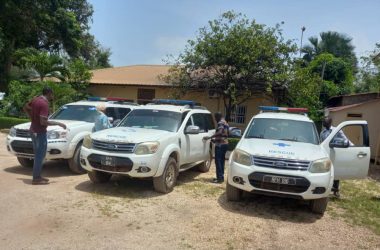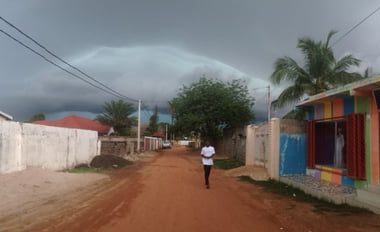
By Lamin J Darboe
It is the inexorable law of nature that every creature will succumb.
Stated differently, human life is transient. In a limited sense, and in our geographic circumstances, what permanence there is belongs to the physical entity called Gambia and its betterment must therefore constitute our collective preoccupation. It is incontestable that we are a posterity to generations past as those yet unborn will be to us.
For some time, and due mainly to endemic mis-governance, Gambia’s permanent location was the edge of the precipice.
What escape then for a country so situated for the better part of a half century!
But mis-governance is not merely about pilfering public resources, about conceptualising, deploying and perfecting the depraved art of unlawful arrest, detention, torture and killing of innocent persons with impunity and for no consideration other than the thrill of sadism.
Mis-governance can also be manifested in the absence of fairness going to the distribution of public resources by public figures in the name of public authority.
In the tumultuous last decade of the struggle for liberation when Professor Babil Mansa was at the height of his depraved rule, when fear pervaded the public life of our nation, and when the chatter decibels on the Gambia Post, and Gambia-L – then the epicentres of civic education and theoretical protest – were at their highest, aspirants to the pinnacle of Gambian public life were on notice that the Third Republic would be a very noisy environment.
The writings were on the wall that the natural yearning for freedom, and the proliferation of education at all levels would unleash new energy in the uncharted territory of unadulterated democratic life in Gambia, that all birds would want to sing, and in that cacophony, some songs may offend public figures.
But those songs are necessary and must be sung especially when they go to legality, to the transcendental value and democratic prerequisite of the rule of law.
With our great man of letters dethroned thanks to a historic arrangement between political parties, Gambia must build anew. On that memorable day of 02 December 2016, I was attending a forty day charity at Yundum when the electoral suspense was broken with the announcement the country had a President-elect in the person of Adama Barrow, the candidate whose face was not known outside a small circle of his party before securing the coveted position of Coalition flag bearer for what became a historic presidential contest.
As the crowds poured on the streets from the coastal community of Gunjur to the hinterland of Yundum, I encountered every emotion on the roads that day. What overwhelming experience! Opposite the Gambia College, a billboard was stripped of the Professor’s hated image and a funeral pyre organised for it. No one was talking economic issues. The universal refrain was “slavery is over in The Gambia”. I understood that as legality and fairness, in short, the rule of law, will be enthroned in this brand new country of ours.
A new country must have a new governing document, and there was overwhelming support for a new Constitution especially since the extant one was orchestrated by the deposed puppeteer of the day, the grandmaster and totalitarian political midwife who was present at the critical juncture of its creation. As he was interested, had absolute power, and wielded the veto, the resulting product was way short of the minimum standard a document like a national constitution must acquire to pass the requisite test of balance and neutrality, a document, so to speak, that can serve as a fitting legacy for posterity.
And so a Bill was transformed to The Constitutional Review Commission Act 2017 (the Act), “an Act to provide for the establishment of a Constitutional Review Commission to draft and guide the process of promulgating a new Constitution for The Gambia and for connected matters”.
For present purposes, pertinent issues going to the naming of Commissioners for the Constitutional Review Commission (CRC) revolve around the following sections of the Act:
4: Composition of the Commission
- The Commission shall consist of:-
- A Chairperson who shall be the Chief Justice or a judge of the superior courts designated in writing by the Chief Justice;
- A Vice Chairperson who shall be a legal practitioner of not less than 10 years standing nominated by the Minister; and
- Nine other members nominated by the President.
- The President shall ensure that the members he or she nominates pursuant to sub-section (1) (c) are individuals of high moral character and integrity who have appropriate academic qualifications and experience in a relevant field of expertise.
5: Appointment of members of the Commission
- Subject to sub-section (3), the members of the Commission shall be appointed by the President.
- The President shall, in appointing the members, have regard to the geographical, professional, age and gender diversity of The Gambia.
- A person shall not qualify for appointment as a member if he or she:-
- is a serving member of any discipline force, whether in The Gambia or otherwise;
- has been convicted of an offence involving dishonesty or moral turpitude;
- is not a citizen of The Gambia;
- is a member of the National Assembly; or
- is of an unsound mind.
I shall dispense with consideration of “high moral character and integrity”, and suspend interrogating “appropriate academic qualifications and experience in a relevant field of expertise” under section 4 (2) of the Act.
In light of the fact that the President and the Minister are accorded specified “nominating” authority by the Act, it is pivotal that the issue of who appointed the Chief Justice, or his designate, to Chair the CRC be ventilated especially considering the surgical precision with which the National Assembly (NA) was excised from participating in the process.
According to information in the public domain, the Attorney General and Minister of Justice (AG) nominated Mrs Salimata Touray, Mrs Fatoumata Jallow, Dr Melville O George, Mr Lamin S Camara, and Mrs Hawa Kuru Sisay Sabally (Sisay Sabally). Except in the case of Sisay Sabally, the AG acted outside the contours of his permissible authority, thus rendering his nominations void and of no legal effect. It is regrettable that the AG gathered about himself powers that are not his to project and without offering any evidence of donation. This constitutes a glaring disregard of the Act by the AG. He simply sat in his office, picked the phone and spread the pork – in US Congressional Appropriations jargon – to a select few and without colour of law for he was in physical possession of a copy of the Act.
Again, the Gambia Bar Association’s (GBA) nominees in Mr Gaye Sowe, and Mrs Janet Sallah Njie are equally void and of no effect in so far as the Act gave no nominating authority to the GBA.
In similar vein, the nominations of Amie Joof Cole, Mr Yankuba Dibba, and Mr Yankuba Manjang, by the Gambia Press Union, The Association of Non-Governmental Organisations, and the National Youth Council, respectively, are void and of no effect. The organisations concerned have no nominating authority under the Act.
As far as geographical diversity, the requirement of section 5 (2) of the Act is not met.
I shall now consider the excision of the NA from the process and argue against the inclusion of the Judiciary in so central a role in the Commission on separation of power considerations.
The task of making a new Constitution is a serious public exercise. Therefore, the social locus must be the people first. While the President is the CEO, the people of The Gambia are the shareholders in the political enterprise. Despite being a directly elected CEO, the NA must not be a mere spectator in steering the course of constitutionalism anew. Its exclusion from a function so central to its constitutionally allocated legislative domain is incomprehensible. That the NA will have a chance to look at the document at a later stage is no justification for exclusion in the selection of CRC members.
A cursory reading of the Act reveals a subjection of the exercise to presidential discretion and judicial supervision to the exclusion of the NA. The latter is in fact the broader representative body and ought to have a role in choosing members of the CRC. Instead, it is paradoxical that no role has been given it in selecting the membership of this August body. All it had to do was debate the Bill and pass it even as it accorded immense powers to the Executive and Judiciary in shepherding this exercise.
In fact the Judiciary’s role as the interpreter of the law conflicts with a legislative function of such magnitude. The departmental demarcations in the 1997 Constitution of the Republic of The Gambia (the Constitution) are such that the role of the Chair, as a sitting member of the Supreme Court, seriously implicates separation of power principles and the fundamental right to fair hearing.
Commenting in an academic capacity, and on the separation issues inherent in this kind of scenario, Patrick O’Brien (2016), Judges and politics: the parliamentary contributions of the Law Lords 1876-2009: “Influenced in large part by jurisprudence of the European Court of Human Rights on the right to a fair trial, the blended roles of the Lord Chancellor and the Law Lords had fallen under a shadow. In the McGonnell case the Strasbourg court held that a judge in Guernsey could not participate in a decision in respect of which he had had a legislative role. For a New Labour government that came to power in 1997 determined to modernise the constitution, the argument that the historical practices worked was no longer enough. The judicial and legislative functions of the office of Lord Chancellor were removed by the Constitutional Reform Act 2005, leaving only the executive ‘justice minister’ function. The judicial peers were excluded from Parliament in 2009, to the evident dismay of some of their number, and a new Supreme Court was created”.
Delivering judgment in McGonnell v The United Kingdom, the European Court of Human Rights, at paragraph 57: “The Court thus considers that the mere fact that the Deputy Bailiff presided over the States of Deliberation when DDP6 was adopted in 1990 is capable of casting doubt on his impartiality when he subsequently determined, as the sole judge of the law in the case, the applicant’s planning appeal. The applicant therefore had legitimate grounds for fearing that the Bailiff may have been influenced by his prior participation in the adoption of DDP6. That doubt in itself, however slight its justification, is sufficient to vitiate the impartiality of the Royal Court, and it is therefore unnecessary for the Court to look into the other aspects of the complaint”.
The decision to assign the position of Chair of the CRC to the Chief Justice, or his designate, implicates the separation of power acutely. As a sitting member of the Supreme Court, and considering his age, Justice Cherno Sulayman Jallow QC will be interpreting the new constitution, a constitution in the drafting of which he would have played a central role for years to come. This is not healthy for democracy under the rule of law.
Silence is not an option and clapping for the AG is out of the question when he so brazenly acted outside the permissible contours of his clearly specified authority under the Act. It is unclear where the selection of the Chief Justice as Chair of the CRC came from but in light of the topography of the Act, the fingerprints of the AG are all over it. On a plain reading of section 4 of the Act, it was a fait accompli without presidential input. An Attorney General ought not arrogate such power to himself!
Although today’s Gambia is clearly far less tumultuous than ancient Rome, and Civil War America, I restate in the seminal words of Brutus in Shakespeare’s Julius Ceaser “… but I love Gambia more…” and in the profound delivery of Lincoln in his second inaugural address: “with malice toward none, with charity for all …”.





Welcome back Mr. Darbo! Good to hear from you again.
My very simple (possibly simplistic!) response is this:
“… nominated by the President” will cover GBA, TANGO suggestions (not nominations!) which are then “nominated” by the President.
…………………………….
I like this:
“By Lamin J Darboe: It is the inexorable law of nature that every creature will succumb. Stated differently, human life is transient”.
Shakespeare puts it beautifully thus: “The CONCEIT of this INCONSTANT stay”.
…………………………….
Bless and a Happy Ramadan.
Must give readers the full SONNET 15. Beautiful ……
SONNET 15
When I consider every thing that grows
Holds in perfection but a little moment,
That this huge stage presenteth nought but shows
Whereon the stars in secret influence comment;
When I perceive that men as plants increase,
Cheered and cheque’d even by the self-same sky,
Vaunt in their youthful sap, at height decrease,
And wear their brave state out of memory;
Then the conceit of this inconstant stay
Sets you most rich in youth before my sight,
Where wasteful Time debateth with Decay,
To change your day of youth to sullied night;
And all in war with Time for love of you,
As he takes from you, I engraft you new.
Thank you, Mr. Darboe. This is a good read. I hope the authorities will do the right thing in the best interest of the Gambia. Possibly revisit the formation of the Constitutional Review Team and apply changes where appropriate.
Dida I just don’t know where to put this, so I randomly choose to write under this thread.
——————————————————————————————
Am truly flabbergasted as to why you choose to write an open letter to Ousainou begging for his intervention in the case of the Gunjur four freedom fighters.
I thought I was hallucinating from the content of that piece.
I deemed it necessary to prepare a response, which I already did, however it will have to wait on my device until the said letter is published on Jollof News for the benefit of the community.
I await with anticipation!
As I said before APRC belong to Dictator Yaya Jammeh that’s why they are still having inside fighting, this party is driven by yaya Jammeh who is away still in control. These fools don’t realize the end of the party and yet they are blind, aprc reputation is already destroyed by dictator yaya Jammeh just like the way he destroyed Gambian economy.
Its bad, bad, bad: 2nd QTR and Cleveland LeBrons losing to GSW – looks like this is it.